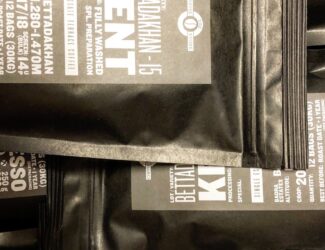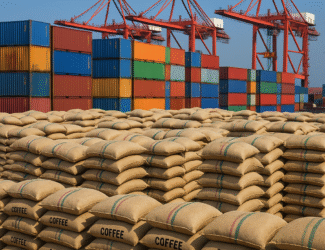
European Coffee Federation (ECF)
The European Coffee Federation (ECF) is the single voice of the European coffee trade and industry, facilitating the development of an environment in which the industry can meet the needs of consumers and society, while competing effectively to ensure the resilience and long-term sustainability of the coffee supply chain, from farm to cup. Established in 1981, ECF represents the interests of the European green coffee traders, roasted and soluble coffee manufacturers, decaffeinators, coffeehouses and warehousekeepers.
The European Coffee Federation counts 16 national associations and 37 company members across Europe, and speaks for over 700 companies, ranging from SMEs to internationally operating companies, representing an estimated total import volume of 40 million coffee bags, or approximately 35% of the world coffee trade volume.
ECF PRIORITIES
ECF offers a forum for exchange, identifying industry-wide issues of common interest in the areas of food safety, sustainability and international trade. The European Coffee Federation is engaged in an open dialogue with the European authorities and relevant stakeholders. We do recognise the need for an effective EU regulatory framework guaranteeing a high level of consumer protection and a level playing field for industry across Europe.
The European Coffee Federation represents the interests of its members towards the European institutions, industry and consumer associations, as well as consumers.
The European Coffee Federation is registered in the EU Transparency Register (no. 958482431512-92), a database of special interest groups whose goal is to influence the law-making and policy implementation process of the EU institutions. The European Coffee Federation complies with their Code of Conduct in all its relations with the EU institutions and their representatives.
FOOD SAFETY & COMPLIANCE
The European Coffee Federation, as the voice of the European coffee industry, is engaged in an open dialogue with the European authorities and relevant stakeholders. We do recognise the need for an effective EU regulatory framework guaranteeing a high level of consumer protection and a level playing field for industry across Europe.
Food safety is paramount to the coffee industry. ECF works closely with regulators, scientists and stakeholders to collect and analyse data and achieve the highest compliance possible. We do anticipate emerging risks or changes in the regulatory framework, as well as advocate for a favourable regulatory environment so that our members’ products meet the highest food safety standards, the latest legal requirements and other established international safety standards.
RESPONSIBLE SOURCING & CONSUMPTION
Coffee is a sought-after commodity, as it is estimated that 500 billion cups of coffee are consumed every year across the globe. Europe accounts for around 30% of global coffee consumption, making it a large and attractive coffee market. Europe has also the highest yearly consumption per capita in the world, even if consumption differs from one country to the other.
As ECF, we advocate for sustainable and resilient food systems that will develop and enhance the lives of coffee growing communities and encourage increasing consumers ethical, economic and environmental aspirations in order to embrace social responsibility and reduce their environmental footprint.
ECF and its members offer all their knowledge and experience from existing private sustainability initiatives in view of contributing to the consolidation of a global level playing field for the coffee sector.
AT ORIGIN
We support and encourage dialogue and engagement with the international coffee community to ensure that conditions are in place to improve the wellbeing, livelihoods and economic success of coffee farming communities.
The coffee sector is involved in numerous private projects, certification and verification schemes and industry-wide voluntary initiatives. The European Coffee Federation and its members strongly believe that sustainability is a shared responsibility and are therefore active in the sector-wide dialogue launched to build consensus and find actionable solutions to drive long-term sustainability in the coffee sector.
We work together and in partnership with other stakeholders in the coffee chain to ensure that coffee is sourced and products are manufactured in a responsible manner. We act as facilitators between the different sustainability initiatives, fostering mutual learning from our actions and experiences, as well as contributing to Public-Private partnerships that are so valuable to ensure sustainability programmes’ effectiveness and efficiency.
Take a look at the various sustainability initiatives in the coffee sector.
AT DESTINATION
We encourage continuous improvement of the environmental performance of coffee products, including by promoting the use of more sustainable packaging throughout the product’s life cycle.
Together with our members, we collaborate with a wide range of stakeholders, from those that source the raw materials to those that dispose of post-consumer waste to gather qualitative information to understand the sector’s performance and to minimise its footprint.
We seek new ways of improving resource efficiency and strive to reduce the environmental footprint of our products through research and innovation. We promote waste reduction in the food chain and a circular economy for coffee. We are committed to identifying efficient, responsible and sustainable solutions for the collection and recycling of coffee single serve units extracted by beverage systems.
We maintain regular discussions to ensure an evidence-based dialogue with EU and national decision-makers on policies targeting packaging and related items used to serve food & drink.
INTERNATIONAL TRADE
Coffee is produced in over 60 countries, in the area known as the “Coffee belt” which is located between the Tropics of Capricorn and Cancer. Each year, the EU imports over 3 million tons of green coffee from the different coffee origins.
Most of the coffee imported in 2019 originated from Brazil (980 262 tonnes) and Vietnam (725 525 tonnes). They were followed by Honduras (235 088 tonnes), Colombia (180 227 tonnes, Uganda (146 009 tonnes), India (139 688 tonnes), Peru (119 799 tonnes) and Ethiopia (83 722 tonnes).
The five main EU importers of coffee in 2019 were Germany (1.1 million tonnes) and Italy (603 983 tonnes), followed by Belgium (301 454 tonnes), Spain (270 108 tonnes), and France (233 600 tonnes).
PROMOTING COFFEE TRADE
The European Coffee Federation promotes the value of the coffee trade to the EU policy- and decision-makers and ensures that appropriate EU policies are adopted to increase the EU import capabilities, especially considering that coffee cannot be grown in the EU. ECF also informs origin countries about the latest EU policy developments and establishes solid links with them in order to coordinate the efforts towards guaranteeing sustainable imports of coffee into the European Union.
GREEN COFFEE STOCKS IN EUROPE
ECF has built ties with major coffee carrying shipping lines and European ports in order to ensure smooth logistics operations and minimize speculations in the coffee trade.
Green coffee stocks in the major coffee ports of Europe
ECF BEST SHIPPING LINE OF THE YEAR AWARD
Since 2018, ECF has been evaluating shipping line performance and awarding the best performer with the ECF Best Shipping Line of the Year award.
The award is granted based on the results of the ECF survey for shipping line performance that is distributed amongst the members of the ECF Logistics Committee. Amongst others, the following aspects are taken into consideration: schedule, frequency, transit time performance, availability of suitable containers and vessel space, booking acceptance, timely release of container at destination or customer service.
For two consecutive years, ECF members have recognized Hapag-Lloyd as the best shipping line of the year.
EUROPEAN STANDARD CONTRACT FOR COFFEE
The trade in green coffee is facilitated if a shipment is bought and sold under the same conditions of sale. ECF provides a common contract – that is well established in the sector – to simplify the procedure and avoid misunderstandings. The ECF European Standard Contract for Coffee (ESCC) facilitates a common framework to enable an agreement between two parties, creating a legal obligation for both to perform specific acts.



